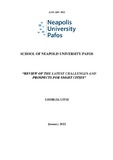| dc.contributor.author | Litsi, Georgia | |
| dc.date.accessioned | 2022-06-22T07:00:06Z | |
| dc.date.available | 2022-06-22T07:00:06Z | |
| dc.date.issued | 2022-01 | |
| dc.identifier.uri | http://hdl.handle.net/11728/12277 | |
| dc.description.abstract | The concept of a Smart City has been theorized and envisioned in the 1990s, but it was in the last decade where the concept became a reality. The European Union with its Horizon 2020 innovation and research program made the creation of Smart Cities a reality. In this study the Lighthouse projects that stemmed from the Horizon 2020 are examined to see the issues they tackled and the course of the actions taken by the participating cities in Europe. To achieve this, all the Lighthouse projects and the participating cities that have either been completed, or are still ongoing from the year 2014 onwards, were examined with regards to their objectives that they had set. For the completed projects the results that they had published were used to investigate if they had achieved what they had set out to do. The results illustrate that over time the focus of the projects shifted from a holistic approach towards the Positive Energy District concept. In addition, in this study, we discuss how the Lighthouse projects and their results helped change and affect different industries (energy sector, automation, and construction industry), the European Union’s goals and the current EU legislation (Green Deal). | en_UK |
| dc.language.iso | en | en_UK |
| dc.publisher | Μεταπτυχικό πρόγραμμα στα Πληροφοριακά Συστήματα και την Ψηφιακή Καινοτομία, Σχολή Διοίκησης και Επιστήμης Υπολογιστών, Πανεπιστήμιο Νεάπολις Πάφου | en_UK |
| dc.rights | Απαγορεύεται η δημοσίευση ή αναπαραγωγή, ηλεκτρονική ή άλλη χωρίς τη γραπτή συγκατάθεση του δημιουργού και κάτοχου των πνευματικών δικαιωμάτων | en_UK |
| dc.rights.uri | Copyright © Georgia Litsi, 2022 | en_UK |
| dc.title | Review of the latest challenges and prospects for smart cities | en_UK |
| dc.type | Thesis | en_UK |

